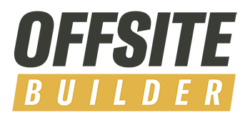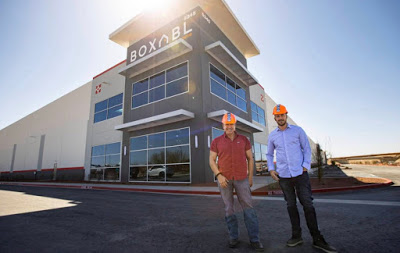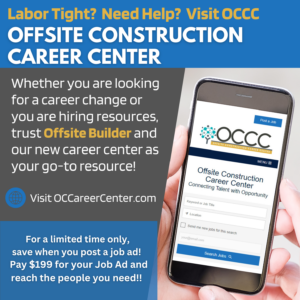Catching up with some recent off-site newsmakers
by Zena Ryder
Ever wonder what happened to that startup you read about when it clinched a massive round of funding? What about that other startup that won an award for inventing the next best thing since socket wrenches?
Although the now-defunct Katerra was in the news every other week, they were the exception. Most startups in offsite construction are quietly plugging away, doing good work in every corner of the country. Good work deserves recognition, so we caught up with seven startups to see what they’ve been doing in the few years since they were founded.
Plant Prefab
Founded 2016 – Based in Rialto, California
Plant Prefab mostly builds custom-designed homes, and they have completed nearly 200 units. “As a kid, I wanted to be an architect,” says Steve Glenn, Founder and CEO. “But I had neither the talent, nor the temperament. I’m doing the next best thing: Working with world-class architects who design great buildings. When people see our homes, they say it looks like a Ray Kappe or a KieranTimberlake or a Toby Long. They don’t say it looks like boxes.”
Plant Prefab designed and patented the Plant Building System, which is based on “specialized” panels that include plumbing, electrical, and finish materials. The panels can be used on their own, assembled into kitchen, bath or mechanical room modules, or built into fully-volumetric modules that comprise entire rooms or sections of a home.
Module
Founded 2016 – Based in Pittsburgh, Pennsylvania
Module has been focused on the infill market in Pittsburgh, designing and selling Zero Energy Ready Homes, which are so energy-efficient that a modest solar array can power them for most of the year. But the benefits actually go beyond energy savings. “You also get a more durable building, better indoor air quality, water-saving fixtures,” says Drew Brisley, Chief Product Officer.
Module is currently working on several projects with 10 or more homes in Pittsburgh. They anticipate moving into larger, denser projects such as row homes as well as continuing to deliver single-family detached homes.
Longer-term, they plan to expand into Philadelphia, Penn. and Washington DC. “We’re enabling infill developers to activate their land as quickly as possible with a streamlined process. We can take care of everything from land acquisition through permitting, financing, and off-site manufacturing to on-site finishing.”
Moducore
Founded 2019 – Based in Stanwood, Washington
Moducore is software designed especially for off-site construction. Their customers include modular manufacturers and component manufacturers. “We started with the systems for bills of materials, procurement, and inventory management,” says Jordie Puchinger, Co-Founder and Director of Technology. “Then we worked with customers to build a labor tracking system.”
Last May, Moducore was acquired by 4Ward Solutions Group, a consulting company based in Stanwood, Wash. that focuses on commercial modular manufacturing. “We had financially more appealing offers, but we chose 4Ward because of their industry prominence and expertise, and because our goals align. We want our software to support the entire off-site industry and 4Ward shares that goal.”
Puchinger says that the company’s customer base has grown 500% to 600% since the acquisition.
Mighty Buildings
Founded 2017 – Based in Oakland, California
Two of Mighty Buildings’ founders had worked on a 3D printing pen, which targeted the consumer electronics market and sold in big box stores like Best Buy. “It was one of the first 3D printers that didn’t use heat. Instead, light triggered the curing process,” explains Sam Ruben, Co-Founder and Chief Sustainability Officer.
They wondered if the same technology could solve a big problem. They learned about the lack of productivity in construction and decided to focus there by making 3D printed homes from what the company website describes as “non-silicate Light Stone Material and steel components.”
Mighty Buildings spent three years learning about building regulations and working with standards organizations. “We had no construction experience and wanted to make sure our buildings were code compliant from the beginning and that our technology would live up to its promise.”
They started by building ADUs (accessory dwelling units) and now also make single-family homes. They’ve been incrementally increasing the amount of 3D printing in their buildings. “In our new panelized system, the entire exterior wall system is 3D printed, while we continue to use traditional floor, roof and interior wall panels,” Ruben says. The non-printed components are prefabricated to ensure on-site work is restricted to assembling components.
The company’s first two developments break ground this year and will, according to Ruben, be the world’s first 3D printed Zero Net Energy Communities.
Fading West
Founded 2016 – Based in Buena Vista, Colorado
Fading West’s mission is “to create high-quality, architecturally-interesting, and diverse communities,” says Founder and CEO, Charlie Chupp. The ‘diverse’ part of that goal means the company’s communities include both market rate and affordable, deed-restricted housing.
Chupp says that fulfilling that mission required Fading West to vertically integrate. “To hit attainable price points, we had to control everything: buying land, getting entitlements, installing infrastructure, manufacturing units, and selling or renting them.”
It took a year to find a local bank willing to fund the startup. The loan was guaranteed by a USDA program to encourage rural development.
Fading West’s first project is The Farm at Buena Vista. The first phase of 90 homes was completed in 2021. A modular manufacturer in Nebraska supplied the units and Fading West Construction finished them. The second phase consists of an additional 51 single-family homes and townhomes. Fading West is building them in their new factory, which opened in November.
Fading West is also planning a 107-unit apartment complex on the site, pending local approval.
Crate
Founded 2018 – Based in Carson, California
Crate makes buildings out of recycled shipping containers. They’re currently working on 40 units of permanent supportive housing, where residents live in their own private units with support services (such as help applying for jobs, or managing mental health) provided on-site. “It’s a private-public partnership with the City of Los Angeles and a private developer,” says Amanda Gattenby, Vice President of Development.
“Because we manufacture products — like cars in a factory — we’re not subject to the change orders typical for on-site construction. So we provide greater cost certainty,” Gattenby says.
Crate also builds faster than conventional construction, both because of overlapping on-site and off-site processes, and also because they use modular plans pre-approved by California’s Factory-Built Housing program. “We just had a five-story, 160-unit permanent supportive housing project approved at the state level in four weeks.”
Since its founding, Crate has provided 432 units for people who had been homeless, as well as several other housing, commercial, and education projects.
Now the company is diversifying. In addition to modified shipping containers, they’re adding steel frame modular. Longer term, Crate is considering moving into other states.
Boxabl
Founded 2017 – Based in Las Vegas, Nevada
Instead of focusing on large investment companies, Boxabl attracted funding from individuals and posted a link to invest on their website.
“Accredited investors can invest a minimum of $10,000,” explains Galiano Tiramani, Boxabl Founder and CEO. Average earners are also welcome to invest. “With our crowdfunding, the minimum investment is only $1000. It’s been cool seeing money come from those two sources to fund the factory.”
Boxabl completed their 170,000 square foot factory in the summer of 2021, and their Casitas — tiny foldable homes — have been rolling out since then.
Boxabl’s first order is with the US Department of Defense (DoD) for 156 units for military base housing, which it will complete in February 2022.
After completing the DoD project, Boxabl hopes to build a flagship community in Las Vegas in partnership with a large national homebuilder. The homes will consist of 400 square foot studios consisting of one box each, and two-bedroom 800 square foot apartments consisting of two boxes each.
After the Vegas project is done, they plan to start building Casitas for their waitlist customers. That waitlist currently has 60,000 names on it, 3000 of whom have paid a deposit.
Zena Ryder is a freelance writer, specializing in writing about construction for businesses, magazines, and websites. Find her at zenafreelancewriter.com







